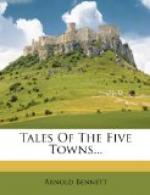‘What for?’
‘He kissed me,’ she said boldly; ‘I’m his sweetheart.’
‘Eh!’ The Inca paused a moment, startled. ’But he killed his sweetheart yesterday.’
‘What! Meg!’ the girl exclaimed with deep scorn. ’Her weren’t his true sweetheart. Her druv him to it. Serve her well right! Owd Meg!’
‘How old are you, my dear?’
’Don’t know. But feyther said last Wakes I was fourtane. I mun keep young for Jack. He wunna have me if I’m owd.’
‘But he’ll be hanged, they say.’
She gave a short, satisfied laugh.
’Not now he’s drunk Licksy—hangman won’t get him. I heard a man say Jack ‘d get off wi’ twenty year for manslaughter, most like.’
‘And you’ll wait twenty years for him?’
‘Yes,’ she said; ’I’ll meet him at prison gates. But I mun be young. Give me a drink o’ Licksy.’
He drew the red draught in silence, and after it had effervesced offered it to her.
‘’Tis raight?’ she questioned, taking the glass.
The Inca nodded, and, lifting the vessel, she opened her eager lips and became immortal. It was the first time in her life that she had drunk out of a glass, and it would be the last.
Struck dumb by the trusting joy in those profound eyes, the Inca took the empty glass from her trembling hand. Frail organism and prey of love! Passion had surprised her too young. Noon had come before the flower could open. She went out of the tent.
‘Wench!’ the Inca called after her, ‘thy groat!’
She paid him and stood aimless for a second, and then started to cross the roadway. Simultaneously there was a rush and a roar from the Cock yard close by. The raging bull, dragging its ropes, and followed by a crowd of alarmed pursuers, dashed out. The girl was plain in the moonlight. Many others were abroad, but the bull seemed to see nothing but her, and, lowering his huge head, he charged with shut eyes and flung her over the Inca’s booth.
‘Thou’s gotten thy wish: thou’rt young for ever!’ the Inca of Peru, made a poet for an instant by this disaster, murmured to himself as he bent with the curious crowd over the corpse.
Black Jack was hanged.
Many years after all this Bursley built itself a new Town Hall (with a spire, and a gold angel on the top in the act of crowning the bailiwick with a gold crown), and began to think about getting up in the world.
* * * * *
MARY WITH THE HIGH HAND
In the front-bedroom of Edward Beechinor’s small house in Trafalgar Road the two primary social forces of action and reaction—those forces which under a thousand names and disguises have alternately ruled the world since the invention of politics—were pitted against each other in a struggle rendered futile by the equality of the combatants. Edward Beechinor had his money, his superior age, and the possible advantage of being a dying man; Mark Beechinor had his youth and his devotion to an ideal. Near the window, aloof and apart, stood the strange, silent girl whose aroused individuality was to intervene with such effectiveness on behalf of one of the antagonists. It was early dusk on an autumn day.




